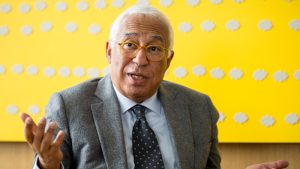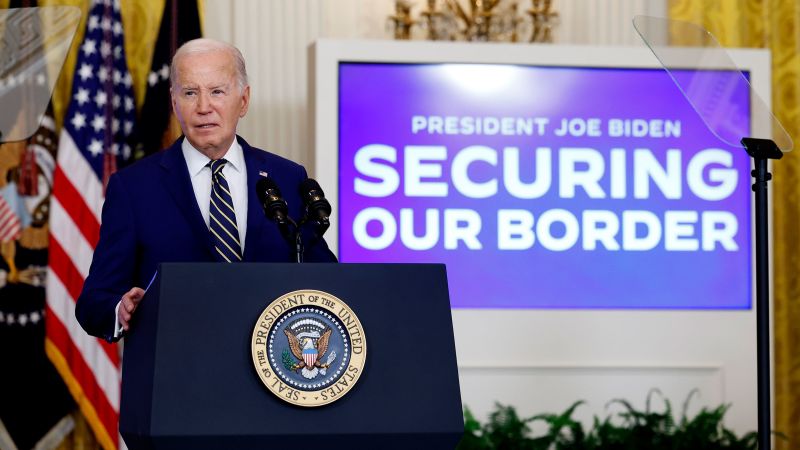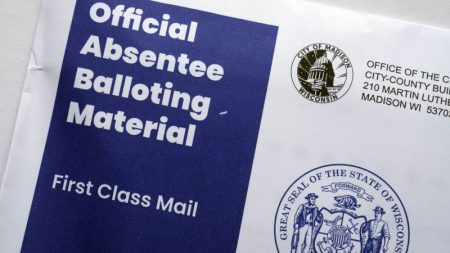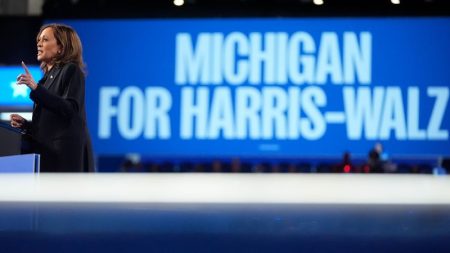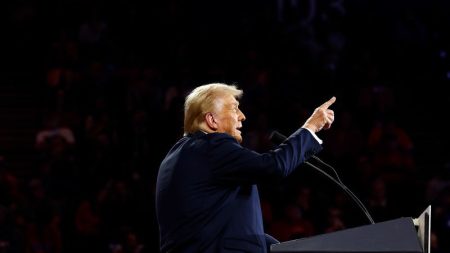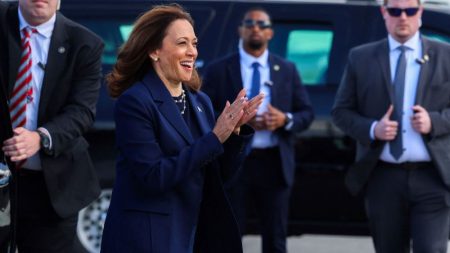Donald Trump hasn’t shown much interest in reaching out to Republicans who hate him.
But Thursday, President Joe Biden will take the first step in trying to win over voters his campaign believes could be the Holy Grail for them in the election, announcing a new national Republican engagement director in what will be a monthslong ramp up into the convention and beyond.
Beyond adding former Rep. Adam Kinzinger’s chief of staff Austin Weatherford as the leader of Republican outreach, operatives in Biden’s headquarters in Wilmington have been digging in on focus groups and polling for clues – particularly about the consistent 20% who kept turning out for Nikki Haley in Republican primaries long after she gave up on her campaign. They muse about Haley-supporting suburban moms focused on national security. They insist there are middle of the road voters exhausted by Trump’s attacks on the Constitution and restoring decency who are ready to find Biden palatable.
CNN’s interviews with two dozen Republican officials and aides, as well as multiple people in the White House and Biden campaign, detail the sometimes stilting, always-a-little-awkward conversations underway between liberal, mostly younger aides and frustrated, mostly older Republicans that go far beyond the generic statements about welcoming Haley voters and a few small but targeted online ads that the campaign has publicly announced.
Senior Biden adviser Anita Dunn has already met with several potential allies like Cassidy Hutchinson, the former assistant to Trump’s chief of staff who turned on the former president in her testimony to the January 6 committee, according to people told about the meeting. Several campaign aides spent last Wednesday on a Zoom call with two dozen Republican former members of Congress, hearing out their complaints and asking them to get involved.
Others who have turned on Trump, like his short-tenured communications director Anthony Scaramucci, have been consulted. Liz Cheney, the former Republican congresswoman, is being deliberately given space to get to what many expect will eventually be a rip-roaring fulfilment of her promise to do what she can to keep Trump from getting back into the Oval Office.
And a slate of GOP speakers for the Democratic convention in August and into the fall is being planned, following a similar schedule and roll-out as in 2020, when former Ohio Gov. John Kasich talked about how terrible Trump was and Cindy McCain recorded an emotional video about Biden’s “friendship that shouldn’t have worked” with her late husband.
In a slide obtained by CNN of the pitch campaign aides made to the Republicans on the Zoom call – next to photos of Biden meeting with members of the military and greeting young children – they laid out their wish list, including “Help us develop tailored outreach plans to recruit high profile Republican endorsements and supporters,” “Volunteer to be surrogates for print, TV, radio, podcasts and digital media stories, including op-Eds,” and “Make yourselves available to bracket key milestones in the Trump campaign,” along with asking for more advice and help notching endorsements from veterans and law enforcement.
“Republicans are leaving Trump in numbers that are well beyond what we’ve ever seen before,” said Jen O’Malley Dillon, one of Biden’s 2020 campaign managers and his 2024 campaign chair. The June 27 debate and other contrast points, she predicted, will remind people “about the chaos and the lack of leadership of Trump” and “harden those protest votes.”
The presentation to the Republican former lawmakers went further: “Many of you will be having these conversations in ways we could not. We need to create systems for feedback loops to bring your read-outs into our campaign strategy.”
But battered and lonely after years of feeling chased out of their own party, many anti-Trump Republican leaders complain they still haven’t heard from the Biden campaign. Agonizing about voting for a Democrat – even with all they’ve said about the threat they believe Trump represents – they insist Biden still has to “earn” their votes and that his positions on Israel and other issues are making that harder. They talk in terms like “creating a permission structure” and “mattering on the margins” as they insist there are more voters like them across the country who don’t want to tell their friends or families – or even pollsters – because they fear being attacked, doxxed, swatted and harassed but will vote against Trump once the curtains on the voting booths are pulled tight.
But while former Virginia Rep. Denver Riggleman told CNN he dreams of a big locking arms event with Biden and fellow apostate Republicans at the White House and Kinzinger told CNN he has offered advice about making more speeches about the fight for democracy in Ukraine, others say they are disappointed to see higher profile anti-Trump Republicans like former House Speaker Paul Ryan sit out so far. Former New Jersey Gov. Chris Christie and former Trump Vice President Mike Pence have said they can’t vote for either candidate. Neither responded to CNN’s request for comment.
Tech billionaire and “Shark Tank” star Mark Cuban, who supported Haley before popping into a Biden fundraiser in Dallas in March, doesn’t think the decision he’s made is a “big revelation or change.”
“I think Joe is a better choice than Trump. That simple,” he told CNN. He wishes he could have compared Biden and Haley or another Republican on the issues, he said. “I miss those kinds of elections.”
But then there’s Larry Hogan, the Republican former governor of Maryland now running for Senate, who – minutes before the Trump verdict came in last week – stood at the front of a room in a retirement home in the suburbs north of Baltimore last week nodding along as a man put a different spin on what has become a very familiar question for him: What should be done about “that one Mr. T – and I’m not talking about the one wearing all the jewelry.”
“Mr. T, ‘I pity the fool,’” Hogan said. “What a great question.”
Hogan, who also endorsed Haley, went into detail about how long he has been critical of Trump, explained that the former president is leading in the polls because Biden has done so badly, “but I have confidence in the American people that hopefully between now and November, they’re going to make the right decision.”
Hogan left out which decision he will make himself. In an interview outside after, he said he wouldn’t vote for Trump or Biden because he doesn’t think either would be a good president and, given that Maryland is expected to be solid blue, “I’m not going to impact the election.”
Shortly afterward, Trump campaign officials said Hogan’s campaign should be over because he released a statement saying to respect the New York verdict.
Many of Haley’s voters were just using her spot on the ballot as a repository for anti-Trump votes, but Republicans and Democrats alike expect most of those voters to – like the former South Carolina governor – go back to Trump even if he never does anything to win them over, as she had said he would have to.
South Carolina Sen. Lindsey Graham, a Republican and committed Trump supporter, said that he’s been pushing Trump to do more outreach but isn’t concerned: “When it’s Biden-Trump, I think most of them are going to come back. And I think those who don’t come back will be offset by people on the left” abandoning Biden.
One person who hasn’t gotten a call: Asa Hutchinson, the former governor of Arkansas whose 2024 GOP primary campaign never got out of the single digits. On his way out of the Capitol after the unveiling ceremony for Arkansas’s new statue of civil rights leader Daisy Bates, Hutchinson said that the votes for Haley should be “a great concern” for Trump.
“You’ve got to worry that in November you’re going to have a lot of voters that will skip that box and go to a Senate race, or they’re going to stay at home,” Hutchinson said, predicting a repeat of a 2020 phenomenon that boosted down-ballot Republicans and left Trump seething that there must have been a conspiracy against him. Or, he argued, “they’re likely to stay home.”
Hutchinson told CNN he won’t stay home himself, but he won’t vote for Biden or Trump. Prompted with the idea that one of those two is almost certain to be president, he said, “We’ll wait and see.”
Indiana Sen. Todd Young – who has said he won’t be voting for Trump because of the events of January 6, 2021, and other issues, but also won’t be voting for Biden – was visibly strained when confronted with the question last month of whether there’s anything that the Democrat could do to win his vote.
“It’s highly unlikely,” Young told CNN after a vote on the Senate floor.
Young stepped onto the subway that runs from the Capitol back to his office building and moved to the back of the car so that reporters could not follow him in.
Asked as the doors closed whether he saw the election as a binary choice, Young grimaced.
“It typically is,” he said.
Christine Todd Whitman, the Republican former New Jersey governor and Environmental Protection Agency administrator under George W. Bush, who is planning to vote for Biden as she did four years ago, said the “neither” answer is not acceptable.
“They should understand that’s the worst possible response, because what you’re saying, is ‘I don’t care, I’m going to be just fine,’” Whitman said, arguing the only excuse is people who might be scared of getting attacked or doxxed or swatted from going public. “All that does is empower people that you don’t want to be empowered.”
But Whitman, who in 2020 was the national chair of Republicans and Independents for Biden, has not heard from the Biden campaign this time.
Joe Walsh, the former Illinois congressman who briefly ran a 2020 primary challenge against Trump, was blunter.
“I understand it: They’re utter cowards,” he said. “They just don’t want to not be a Republican anymore. As bad as they think Biden is on policy, they know Trump is unfit.”
Some anti-Trump Republicans who don’t want their party to be this way have tried to get themselves into a familiar Zen: Trump would serve four more years, they figure, probably pass some tax cuts they would agree with, and then he would fade because he wouldn’t be running for president anymore. Some feel like they fought Trump as long as they could but think now is the time to accept that they lost and make the best of it.
Some insist they remain the true Republican Party and see 2024 as the chance to wrest it back from the pretenders they see in Trump and others who have followed him to the point of wearing marching long red ties, that their votes for Biden will be the first steps in rebuilding a Republican Party where Reaganism rises again over MAGA.
“Who are the real Republicans – the Maggots or people like me, who believe in markets, who believe in family, who believe in a military that is strong but also diplomacy? I maintain that I’m the real Republican and the Maggots are not. They are the RINOs,” said Claudine Schneider, a former Republican congresswoman from Rhode Island, using a derogatory riff on MAGA and the “Republicans in Name Only” acronym Trump often uses for Republicans who don’t support him.
Schneider said traditional Republican values should point to Biden. While she said she has heard the complaints he has veered too far left, investments like infrastructure and the CHIPS and Science Act are what her fellow Republicans should support – and also, she added, because “he, I believe, can be trusted. He has integrity. And that cannot be said of the other guy whose life is all about lying and cheating.”
Geoff Duncan, the former lieutenant governor of Georgia and current CNN contributor, broke with Trump and wrote an op-ed in May saying he was voting for Biden and encouraging other Republicans to join him. He explained that he hoped he could be the bridge both to more bipartisan policy out of Biden and for voters to reject Trump and start sending non-MAGA Republicans to Congress.
“This is a really easy play: We need about 10 million Republicans to say, ‘Enough. Enough, enough, enough – we can no longer fake the fact that Donald Trump is a real Republican,’” Duncan said, imagining that if 10 million Republicans vote in down-ballot candidates, then during a Biden second term, “we give ourselves four years to hit the reset button, rebuild the Republican Party.”
Duncan said he started to make the case on the bipartisanship to Biden when the president called him to thank him for the op-ed and felt good about the conversation.
But on Israel, immigration and other top policy areas, frustration among Republican leaders with Biden remains high, as does skepticism among Republicans that he is interested in sincere compromise with them at the risk of aggravating his own base.
“This swath of Republican strategist types are literally begging the Biden campaign to give them a reason to support him,” a former House Republican leadership aide told CNN. “‘Will he do that?’ is the unanswered question.”
Two Bushes, neither in hand for Biden
George H.W. Bush put out word in 2016 that he voted for Hillary Clinton over Trump. People involved tell CNN that Biden’s campaign reached out to George W. Bush in 2020 to see about an endorsement then but came up short – the only other living Republican president wanted to stick to his philosophy that ex-presidents should stay out of direct politics.
That didn’t stop his clearly non-MAGA worldview from slipping out several times over Trump’s presidency, conspicuously very quickly congratulating Biden after the election was called and condemning January 6 in a statement, “I am appalled by the reckless behavior of some political leaders since the election and by the lack of respect shown today for our institutions, our traditions, and our law enforcement.”
Though Bush’s popularity has plummeted among Republicans overall, “he’s obviously the biggest voice of any of us. He’s a decent man,” said Kinzinger. “It would certainly give a permission for a lot of people. There are still Bush Republicans left that are voting for Trump grudgingly, and they just don’t know their party has left them yet.”
Responding to radio host Howard Stern last month asking, “Where’s Jeb Bush? Where’s George Bush? Why don’t they say ‘Hey, I’m interested in saving democracy for our grandchildren?’” Biden said only, “Well – I don’t think the election is over yet on that score.”
Asked about whether that meant there were conversations underway and if he would consider voting for Biden in November, Jeb Bush, who has taken to tweeting approvingly about articles that decry the state of American politics, told CNN by email that he wasn’t going to comment, but “thanks for thinking of me.”
In the Maryland Senate race, Hogan said Bush called to urge him to get in because, Hogan recalled the former president, saying, “I think you’re the voice to get us back on track.”
Hogan said Bush had been disappointed he hadn’t run in the Republican presidential primary against Trump – but added that he would be surprised if 43 weighed in directly.
“He doesn’t want to interfere,” Hogan said. “But that doesn’t mean he doesn’t still have opinions and he doesn’t still care about things.”
A spokesman for the former president also declined comment.
“You can hold your nose and vote for Biden and not be in public screaming about it. You can mark your ballot, vote to keep this democracy going instead of voting affirmatively to end it,” said Kristopher Purcell, an operative who in 2020 was on the organizing committee for a group called 43 Alumni for Biden.
But Purcell has also not yet heard from the Biden campaign this time.
Read the full article here

